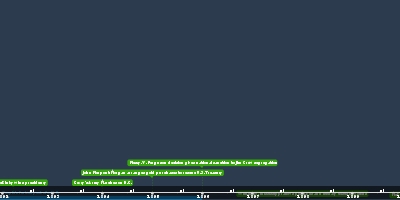24 mars 1896 - William McKinley wins presidency
Description:
While their racial policies were abhorrent, that did not prevent the national Democrats from astonishing the country in 1896 by embracing parts of the Populists’ radical farmer-labor program. They did so in defiance of President Cleveland, whose decisions continued to alienate him from his party’s agrarian and labor base. Despite the worsening economic depression, collapsing prices, and a hemorrhage of gold to Europe, the president refused to budge from his defense of the gold standard. With gold reserves dwindling in 1895, he made a secret arrangement with a syndicate of bankers led by J. P. Morgan to arrange purchases to replenish the treasury. Morgan helped maintain America’s gold supply — preserving the gold standard — and turned a tidy profit by earning interest on the bonds he provided. Cleveland’s deal, once discovered, enraged fellow Democrats.In 1896, amid such outrage, Democrats rejected Cleveland and nominated a young Nebraska congressman, free silver advocate William Jennings Bryan, who passionately defended farmers and workers and attacked the gold standard. “Burn down your cities and leave our farms,” Bryan declared in his famous convention speech, “and your cities will spring up again as if by magic; but destroy our farms and the grass will grow in the streets of every city in the country.” He ended with a vow: “You shall not crucify mankind on a cross of gold.” Cheering delegates endorsed a platform calling for free silver and a federal income tax on the wealthy that would replace tariffs as a source of revenue. Democrats, long defenders of limited government, were moving toward a more activist stance.
Populists, reeling from recent defeats, endorsed Bryan in the campaign, but their power was waning. Populist leader Tom Watson, who wanted a separate program that was more radical than Bryan’s, observed that Democrats in 1896 had cast the Populists as “Jonah while they play whale”: Populists had been swallowed up. The People’s Party never recovered from its electoral losses in 1894 and from Democrats’ two-pronged attack: ruthless opposition in the South and cooptation at the national level. By 1900, rural voters pursued reform elsewhere, particularly through the new Bryan wing of the Democratic Party.
Meanwhile, horrified Republicans denounced Bryan’s platform as anarchistic. Their nominee, Ohio congressman and tariff advocate William McKinley, chose a brilliant campaign manager, coal and shipping magnate Marcus Hanna, who orchestrated an unprecedented corporate fund-raising campaign. Under his guidance, the party backed away from moral issues such as prohibition of liquor and reached out to new immigrants. Though the popular vote was closer, McKinley won big: 271 electoral votes to Bryan’s 176
William McKinley, a powerful presence in the White House, was no reformer. His victory was widely understood as a triumph for business and especially for industrial titans who had contributed heavily to his campaign. But the depression of the 1890s, by subjecting millions to severe hardship, had dramatically illustrated the problems of industrialization. At the same time, the success of McKinley’s campaign managers — who spent more than $3.5 million, versus Bryan’s $300,000 — raised unsettling questions about corporate power. Once the crisis of the 1890s passed, many middle-class Americans proved ready to embrace progressive ideas. The rise of such ideas was aided by historical chance, with a sudden assassination.
Ajouté au bande de temps:
Date:
24 mars 1896
Maintenaint
~ Il y a 129 ans
